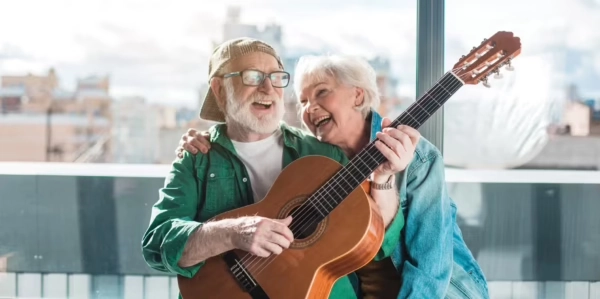
Music, Medicine for the Mind
If you want to firm up your body, head to the gym. If you want to exercise your brain, listen to music.
There are few things that stimulate the brain the way music does. If you want to keep your brain engaged throughout the aging process, listening to or playing music is a great tool. It provides a total brain workout.
Research has shown that listening to music can reduce anxiety, blood pressure, and pain as well as improve sleep quality, mood, and mental alertness. It is intrinsic to all cultures and can have surprising benefits not only for learning language, improving memory and focusing attention, but also for physical coordination and development.
The research is abundant as to the healing power of music. A recent study from Emory University School of Medicine confirms that dementia and Alzheimer’s patients can recall memories and emotions and have enhanced mental performance after singing classic hits and show tunes. A similar study from Northwestern University states that “music training and involvement has biological impact on the aging process.”

Oliver Sacks, author of Musicophilia, speaking to the U.S. Senate’s Special Committee on Aging stated, “Though the nervous system is sometimes compared to a computer, I think it is much more like an orchestra or symphony. I think we are musical through and through, from the lowest levels of rhythm in our nerve cells to the highest levels. There is a vast range of neurological disorders in which this inner music is impaired, and all of these can be transformed by the healing power of music.”
The soundtracks of our lives resonate even more deeply because of the feelings attached to certain music.
Those songs are tied to strong emotional moments and experiences. And they’re not just stored in one area of the brain. When we hear those old, meaningful tunes, even half a century later, they stimulate multiple areas and networks of the brain – including areas that are relatively unharmed by a disease like dementia – and those long-ago memories resurface. That’s why a person with memory impairment may not recall their daughter’s name but may remember all the lyrics to her favorite lullaby.
It’s no surprise that Clark provides musical opportunities for all our residents. From residents gathering around a piano and singing hymns, to concerts, programs, gatherings and most especially Music Therapy, musical experiences are abundant on the campuses.
An integral part of the lives of memory care residents, Clark’s Music Therapy programs are not simply fun activities, but rather medicine for the mind. Residents participate in group activities and also have individualized one-on-one sessions. Music in Nature, is an off-site program for small groups of memory care residents that provide personalized sessions in a natural environment. Funding to initiate the program was provided by a generous grant from the Towsley Foundation.
Clark is committed to improving and growing our Music Therapy programming. We hope you will be inspired and consider making a gift to Music Therapy.
Get Pricing & Availability
Get pricing and availability or schedule a tour (private or virtual) to see if Clark is right for you or your loved one.
Questions?
Call (616) 278-6520 or email
marketing@clarkretirement.org
"*" indicates required fields
